TODAY CQN brings you the sixteenth EXCLUSIVE extract from Alex Gordon’s book, ‘CELTIC: The Awakening’, which was published by Mainstream in 2013.
The book covers the most amazing decade in the club’s history, the Sixties, an extraordinary period when the team were transformed from east end misfits to European masters.
THE final year of the clearly defining and most decisive decade in Celtic’s history kicked off with two games within forty-eight hours and, like the preceding nine years, they were graphically lop-sided; a 5-0 triumph and a 1-0 defeat.
Tommy Callaghan had endeared himself to the Parkhead faithful right from the start. His awesome work ethic was greatly appreciated by the supporters. Bertie Auld said, ‘When I signed for the club first time around back in 1955, my dad Joe accompanied me to Celtic Park. Afterwards, Jimmy McGrory gave us a wee tour of the ground.
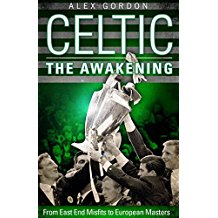
‘My father took me aside. He waved over at the old Jungle and told me, “Son, if you work hard and give it everything you have got, those supporters in there will love you. They are knowledgeable, they enjoy their football. You won’t always be the star man, but if you show a willingness to work, no matter how you are playing, they will back you.” My dad was right.’
It appeared that the same advice could have been given to Callaghan, a tireless performer and Jock Stein’s most expensive buy, at £35,000, from Dunfermline earlier in the season. The player was nicknamed Tid which took a bit of explaining. His brother Willie, who played right-back for Dunfermline, was the older of the two. So, Tommy was the tiddler in the family and, in time, that was shortened to Tid.
One thing was sure, though, he didn’t come up short at any time for Celtic. He cut an athletic, straight-backed figure in the green and white hoops. To him fell the honour of scoring the first goal of 1969 for the club, a raking twenty-five yard drive that hurtled past the helpless Clyde goalkeeper John Wright. He added another in a 5-0 success. I reminded him of his thundering effort for the first goal that day.
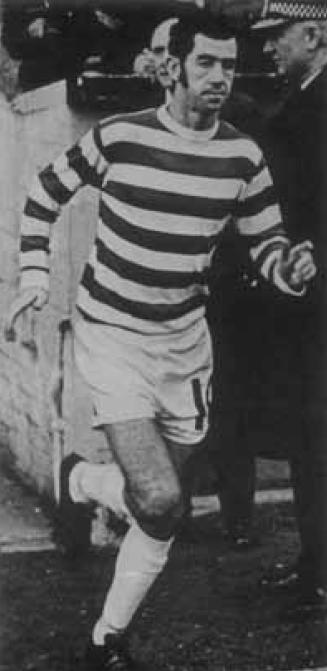
NEW BHOY…Tommy Callaghan, Celtic’s record £35,000 buy from Dunfermline,
‘Yes, I remember it well,’ he said. ‘Do you know I could still score that sort of goal today!’ Now all eyes were on Ibrox the following day. Celtic had dropped three out of four points against their age-old foes the previous season and had already shed two in this campaign.
Stein was eager to notch his first league triumph over Davie White at the third time of asking. The young Rangers manager was experiencing some turbulence since the 2-2 draw with Celtic the previous new year. Colin Stein, the £100,000 purchase from Hibs, had scored eleven goals in his first seven games, including back-to-back hat-tricks against Arbroath and Hibs in his first two appearances. He was a potent force and had formed partnerships with Willie Johnston and Alex Ferguson.
To say the least, though, his temperament was suspect and he was ordered off three times in his initial season as a Ranger. The hierarchy at the club were far from satisfied by the lack of discipline displayed by their centre-forward whose entire game depended on power, energy and strength. His misbehaviour would cost Rangers dear later in the season.
On 2 January, though, he was in place to lead the attack, alongside Johnston, against Celtic. Jock Stein’s side went into the contest with twenty-nine points, four ahead of Rangers. Both teams had scored thirty-nine goals, but the Parkhead men had conceded only twelve to the Ibrox side’s eighteen. Celtic, then, held the upper hand, but things could change dramatically if Rangers clawed the points advantage back to two. John Fallon was still the last line of defence – he had played the previous nine games during Ronnie Simpson’s enforced absence – and Stein stiffened up the midfield with the choice of Jim Brogan to partner Bobby Murdoch. Willie Wallace, scourge of the Ibrox side during that campaign with five goals from three matches, led the attack.
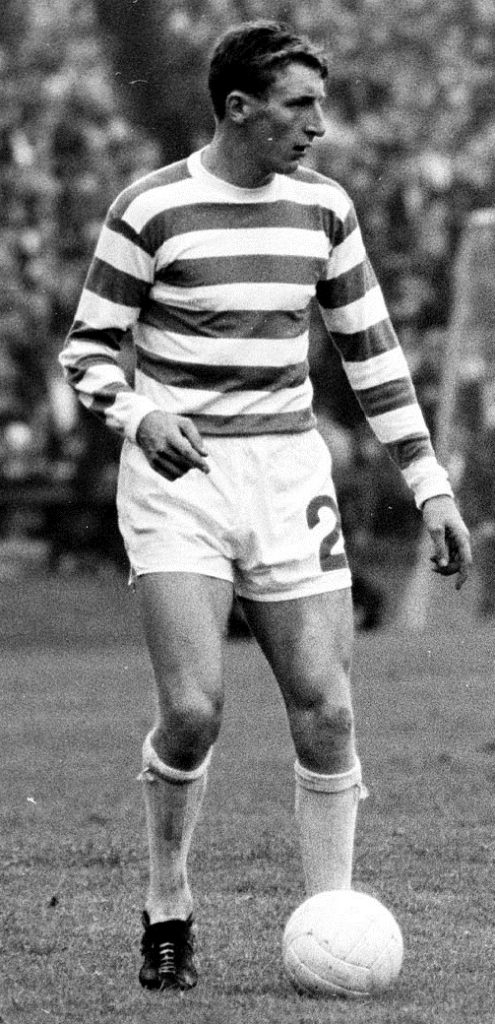
CONCERNED…Tommy Gemmell wasn’t happy at shedding four points to Rangers.
‘Honestly, I don’t remember too much about the game apart from John Greig scoring a penalty-kick to give them a 1-0 win,’ said Gemmell. ‘What I do recall is that it was a fairly dour encounter. I think both teams got bogged down in the middle of the park with the players in there nullifying each other. There wasn’t much space on the wings, either, with Jinky and Big Yogi starved of service. I was up against Willie Henderson, but he didn’t get much joy that day, either, and Jim Craig, over at right-back, had Orjan Persson in his pocket.
‘So neither keeper was called in to action too often and it was one of those days when it looked as though a penalty-kick or a free-kick might settle the issue. Unfortunately, for us, it was a penalty for them that gave them the points. John Greig must have been taking pointers off me on how to take a spot-kick. He fairly leathered the ball and it seemed to just go straight up into the net with John Fallon taking off to his right. Obviously, Big Jock wasn’t in the best of moods afterwards. We had now lost both our league games to Rangers, dropping four points in the process.
‘We had played well enough on both occasions, but had nothing to show for it and we also realised we had allowed the Ibrox side back into the title race. They were two points adrift, but there were still fifteen games to play and that represented thirty points to be won or lost. It looked as though we were in for another fraught climax to the campaign. We were up for it, though.’

It was imperative Celtic got back on track immediately with the ever-dangerous Dunfermline due in Glasgow only two days later. Stein dropped Johnstone onto the substitutes’ bench, switched John Hughes from left to right, reinstated Stevie Chalmers to the main striking role and there was also a place in midfield for Callaghan, overlooked for the Old Firm match. The changes clicked and two goals from Wallace and one from Lennox earned the champions a solid 3-1 victory. Around this time the end was in sight for the conundrum that was Pat McMahon. He scored in a 3-1 triumph over Dundee United at Tannadice, but Stein seemed hesitant to utilise the youngster’s talents on a consistent basis.
‘He was such a quiet laddie that no-one even swore in his presence,’ recalled Gemmell. ‘He was different from what we were used to at Celtic.’ McMahon’s strike against the Tayside outfit brought down the curtain on his brief career in the hoops. He never featured again and left for Aston Villa in the summer. His was a puzzling stay at Parkhead. Undoubtedly gifted, but, as far as the manager was concerned, lacking that certain something that marked out a Celtic player.
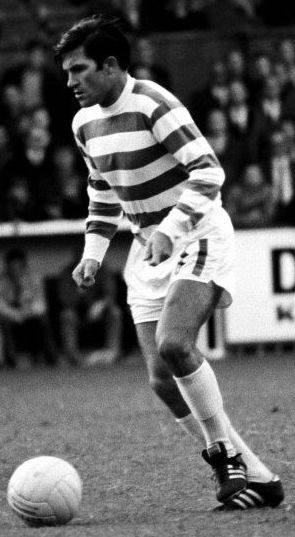
BUST-UP…Bertie Auld was unhappy at snub from Jock Stein.
The Scottish Cup trail began at Firhill on the last Saturday of January and for one Partick Thistle player it was a memorable encounter. Johnny Flanagan, a fleet-footed frontman in the mould of Bobby Lennox, claimed a stupendous hat-trick. Thankfully, though, Murdoch, Wallace and Hughes responded in a thrilling 3-3 draw to take the game to a replay at Parkhead the following Wednesday. A behind-the-scenes bust-up between Stein and Auld came close to seeing the player leave the club in controversial circumstances.
Auld recalled, ‘I had been a substitute in the first game at Firhill. I didn’t get on, but the least I expected for the replay was to get a place on the bench again. Big Jock didn’t say a thing in training as we prepared for the game and then he pinned up the team on the notice board. I couldn’t believe it – I had been dropped. I was out of the picture without kicking a ball. How bad can you be sitting on a bench? I was far from happy. In fact, I was raging. He had selected the exact same starting eleven, but Stevie Chalmers had now been put on stand-by.
‘I went to see the manager and have it out with him there and then. He never liked confrontation, but I wanted some sort of explanation. He just waved me away, so I left the ground, jumped in a taxi and headed for my favourite restaurant in Glasgow, The Vesuvio in St.Vincent Street. I knew the Italian owners – brothers Enzo, Mario and Humberto Romaro – and they were more than a little surprised to see me walking through their door. “Ees the game off, Bertie?” I was asked. “No, it’s on okay, but I’m not involved.” They saw my mood and left me alone.
‘I realised Big Jock might take some sort of action, but, at that particular moment, I wasn’t looking too far ahead. I thought the manager might at least have hinted that I wouldn’t be participating. He knew how much it meant to me to play football. I wasn’t happy on the substitutes’ bench, but I was willing to tolerate it in the hope I might get on at some point and get a kick at the ball.’ All these years down the line, Auld can now afford to laugh at the incident and say, ‘Mind you, they didn’t seem to miss me – they won 8-1!’
Callaghan led the assault on the Partick Thistle goal and collected two goals with McNeill, Gemmell, Lennox, Hughes, Wallace and Johnstone sharing the others. If Celtic had made heavy work in their first tussle against the Maryhill outfit, it was nothing to the agony they subjected their supporters to in the next round against Clyde at Shawfield the following month. The game finished goalless and it signalled the beginning of the end of the glorious playing career of Ronnie Simpson, at the age of thirty-nine. He wouldn’t play again that season and performed only two more times the following term before calling it a day.
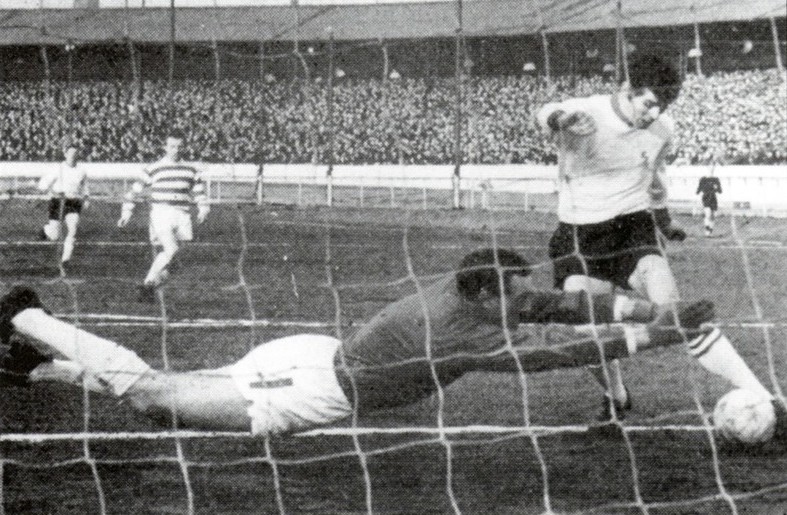
THE BEGINNING OF THE END…Ronnie Simpson dives bravely to save at the feet of Clyde striker Jimmy Quinn, who was on loan from Celtic! The veteran keeper had to be replaced with Tommy Gemmell after injuring a shoulder.
Fittingly, for such a popular character, Celtic were victorious in both those games. It was only right and proper that such a fine professional, after a quarter-of-a-century in the game, should leave as a winner. Simpson’s game against Clyde ended in the second-half when he went down awkwardly on a brick-hard surface saving at the feet of Jimmy Quinn, who, ironically, was on loan at the Shawfield side and still registered as a Celtic player. Goodness only knows why Quinn was allowed to play against his parent club. What would have happened if he actually scored at that fatal moment? Heads would surely have rolled along London Road. Gemmell got the nod to go into goal with Auld coming on as a substitute.
Gemmell remembered, ‘Everyone knew I fancied myself as a striker, but what they might not have realised was that I fancied myself as a bit of a goalkeeper, too. It was sad to see Ronnie go off that day. He was obviously in a lot of pain and we also knew that his shoulder couldn’t hold out forever. When I saw him go off in some considerable distress I wondered if we would ever see him again in Celtic’s goal. My immediate concern that day, though, was to make sure Clyde didn’t score. That would have been a travesty. We were top of the league, were in the League Cup Final and we were also in the quarter-finals of the European Cup. The Scottish Cup was also in our line of sights, so it was absolutely crucial we weren’t on the receiving end of a shock at Shawfield.
‘I had a stint in goal at the end of most training sessions at Barrowfield and I knew it was of the utmost importance not to let your opponents realise you were, in fact, a stand-in goalkeeper. I had to act like I had played in goal all my life. We’ve all seen games where an outfield player goes into goal and that’s exactly what he looks like; an outfield player in goal. He doesn’t look comfortable.

‘So, I had to make sure that none of the Clyde players thought they had a hope of scoring from all sorts of ranges or angles. I had to put it into their heads that they would have to work hard for anything they might get against me. They would have to treat me as they would any other goalkeeper. To me, that was vital. If I went for a crossball I had to go with conviction. I wouldn’t be seen flapping at the ball and just happy to get a touch. I would want to hold the ball. I wasn’t interested in merely palming it away where it could go straight to the feet of an opponent who would stick it in the pokey.
‘The guys in front of me did a great job for the remainder of the game, I must say. Clyde did get a chance, though, very late on. Harry Hood got through, but I managed to get down at his feet and smother the ball. Harry, of course, later became a team-mate at Celtic and I never tired of reminding him of that moment.’
Fallon came in for the replay and goals from Murdoch, Chalmers and Hughes eased Celtic through to the quarter-final on a 3-0 scoreline. Davie Hay made his second first team appearance alongside Billy McNeill in central defence and he recalled, ‘Naturally, I found it all very exciting. I played against Hamilton in the League Cup, but, after winning 10-0 in the first leg, we were already through. This was different entirely. We were facing Clyde on a level basis with everything to play for. Big Jock was showing a fair bit of belief in me and I was determined not to let anyone down. The more experienced players around me were a great help, too. It was fairly satisfying evening with us winning and keeping a clean sheet, as well. That was very important to me.’
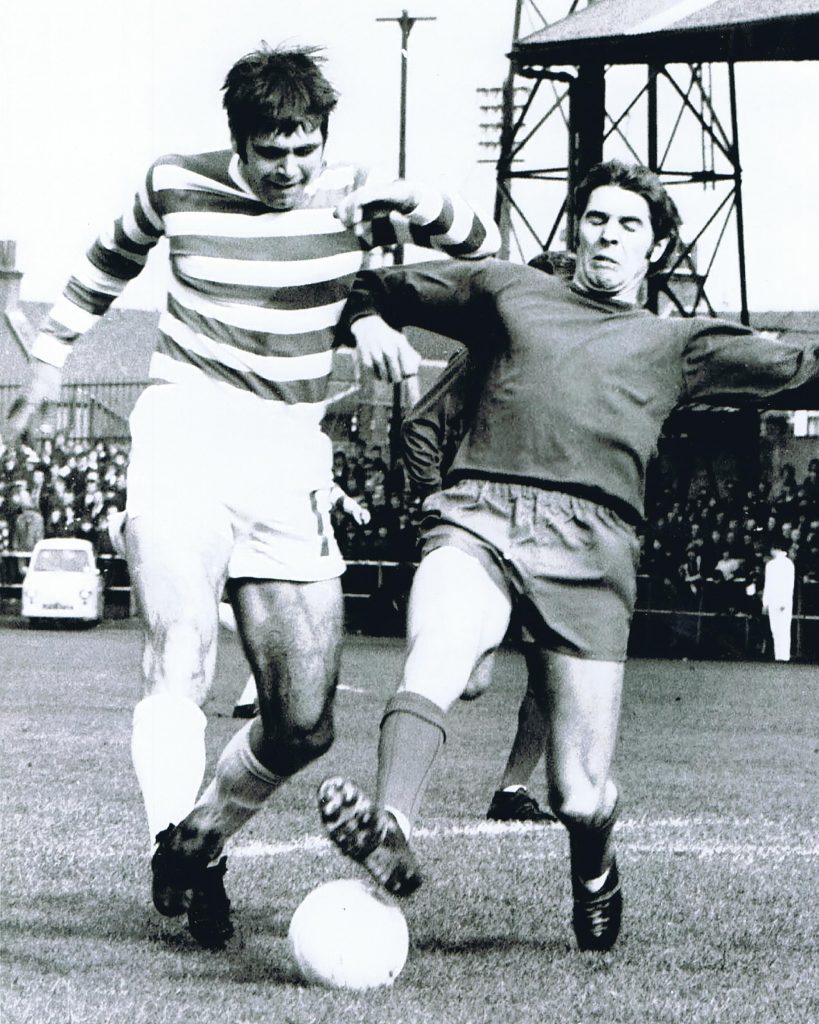
EUROPEAN SPECIALIST…John ‘Yogi’ Hughes was brought in against AC Milan.
Sandwiched in between the Clyde confrontations was a European Cup meeting with AC Milan at the San Siro stadium. The game ended goalless, but it was a victory for sophisticated tactics from Stein over his counterpart, the impressive Nereo Rocco. Gemmell recalled, ‘In the semi-final against Dukla Prague in 1967, we played a blanket defence. On that occasion, Bobby Lennox was told to come back to play just in front of me and Jinky was ordered to do the same alongside Jim Craig. Big Jock wasn’t worried if either player even crossed the halfway line that day. The game against AC Milan was different. There would be no gung-ho attacking, but we would try to master the midfield, hold onto possession as long as possible and, basically, try to stay in control.
‘The tie was played in a blizzard, but I remember both teams coping really well with the conditions. There were 81,000 fans in the stadium and I’m told that tie generated record receipts for the home club of over £135,000. An awful lot of money in those days. Just think – Big Jock could have bought Tommy Callaghan and still had £100,000 left over! The game ended goalless and I would like to think both sets of supporters got their money’s worth.’
The much-maligned Fallon pulled off a couple of splendid saves, Connelly looked comfortable patrolling in the midfield alongside Murdoch and, in fact, Celtic might have snatched the winner late on. John Hughes, who had been sidelined with an injury and out since facing Partick Thistle in the Scottish Cup replay at the end of January, was pitched in against the Italians. ‘I was amazed when Jock told me I was playing,’ recalled Hughes. ‘He just took me aside, told me I was in and to go out there and do a job for Celtic. Just like that. We could have been playing Alloa and not AC Milan.’
Hughes came the closest to scoring when he embarked on one of his astonishing solo sorties that saw him float past four defenders before he blasted a shot goalwards. Goalkeeper Enrico Cudicini threw up both his hands more in desperation than anticipation and, as luck would have it, the ball crashed against his palms and rebounded to safety. A few inches either way and it would have been a goal.
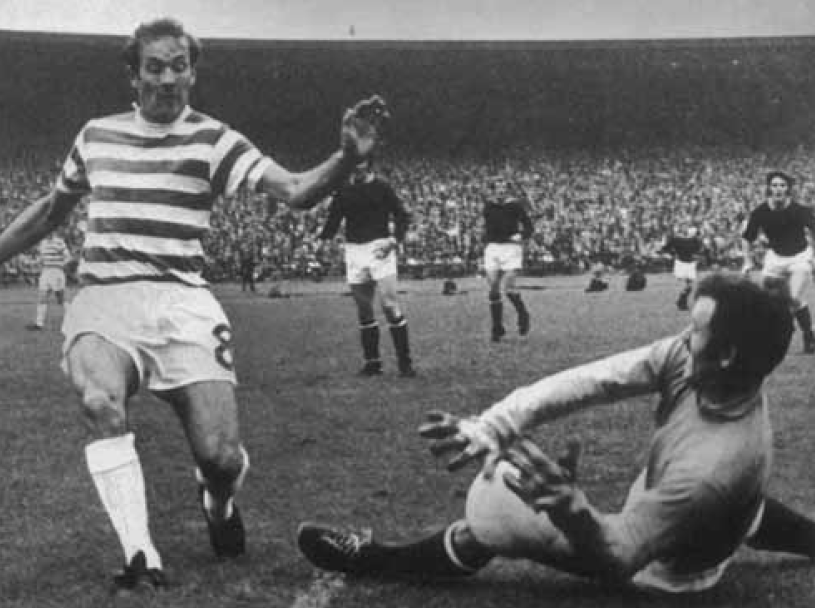
DEFIANT…Hearts keeper Jim Cruickshank thwarts Celtic’s Harry Hood.
February in the league, saw a positive start with a runaway 5-0 success over Hearts at Parkhead. Auld, having patched up his differences with Stein, was back in the engine room of the side alongside Murdoch. Hearts had Jim Cruickshank to thank for keeping the score down to five.
The overworked keeper was often linked with Celtic, but, despite buying over twenty shotstoppers during his reign at Parkhead, Stein was never tempted to move for the player who was, in fact, a neighbour of his in the King’s Park district of Glasgow. That success over the Edinburgh side was Celtic’s only league game that month, although the club managed to fit in the two Cup-ties against Clyde despite the adverse weather conditions.

* TOMORROW: Don’t miss the second part of ‘TROUBLE IN PARADISE’, another dramatic instalment from Alex Gordon’s book, ‘CELTIC: The Awakening’ – only in your champion CQN.

